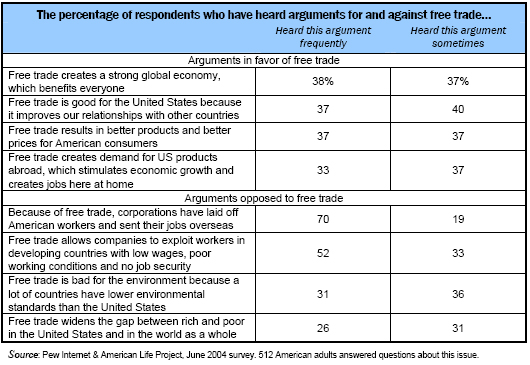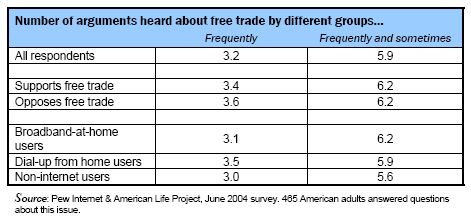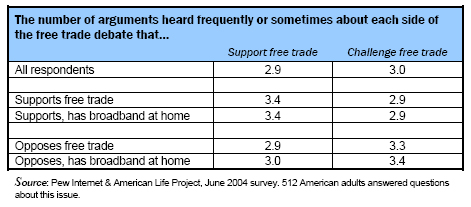Introduction
We asked 512 respondents a series of questions regarding free trade. The respondents were fairly evenly divided between supporters and opponents: 31% said that free trade agreements have been mostly good for the U.S. economy and American workers, 41% said the consequences of the agreements have been mostly bad, and 28% were undecided.
Free trade is the least familiar of the three policy issues.
The eight arguments we asked about are summarized below. Respondents’ familiarity with different points of view about free trade is summarized in the tables that follow. A typical respondent heard 5.9 arguments about free trade. As in the other two cases, respondents heard more than half these arguments on a regular basis, with an average of 3.2 free trade arguments heard frequently. Though awareness of the arguments surrounding this issue was lower than either for Iraq or gay marriage, respondents were still more familiar with free trade arguments than they were with the arguments about the candidates.
Unlike the other issues, respondents’ exposure to the two sides of the free trade debate was quite balanced. The typical respondent heard 3.0 arguments from each side.

As with exposure to campaign information and information about Iraq, respondents’ attitude toward free trade had no significant effect on the average number of claims heard. The effect of internet access, however, was mixed. People with broadband access typically heard more arguments at least once in a while compared to those with dial-up, but dial-up users heard more arguments frequently than either broadband or non-internet users.

People are more familiar with arguments that back their views than challenge their views on free trade.
The typical respondent is more familiar with arguments supporting his or her viewpoint about free trade, matching our finding regarding the campaign and gay marriage. In contrast to the other analyses, however, there were no significant differences in exposure among respondents with different internet access.

Other factors influencing overall argument exposure
Many of the same factors reported in the other sections of this report influenced people’s exposure to the free trade arguments overall. Men were typically aware of more arguments than women. Older Americans had typically heard more arguments than their younger counterparts. Respondent who also used radio or magazines to get their news were also more likely to be have heard free trade arguments than those who did not.
The effects of openness on exposure to free trade exposure were generally as expected. People who said they like to hear about politics and world affairs were more likely to have heard most of the arguments than those who shy away from politics. Those who said they tended to be slow to make a decision even after gathering the relevant information had, however, heard less about free trade.
As in all other analyses, internet use was associated with increased issue exposure overall. Controlling for other factors, internet users were typically familiar with a greater number of arguments.
The internet’s effect on exposure to arguments that challenge people’s position
Using regression analyses to look at people’s exposure to cross-cutting views on the issue of free trade yields results that are somewhat ambiguous. For free-trade proponents, broadband access is negatively correlated with exposure to arguments critical of free trade. However, it is also negatively correlated with exposure to arguments favoring it. This suggests that people who support free trade are not aggressively using the internet to acquire information on this topic. Opponents of free trade, on the other hand, have heard more arguments in defense of free trade when they use the internet. At the same time, broadband use is negatively correlated to a modest degree with exposure to anti-free trade arguments these arguments. Thus, for free trade opponents, the internet’s net effect is to increase exposure to challenging viewpoints.
The segments of the information market on free trade
Omnivores: Of those who answered questions about free trade, 62% were Omnivores. As they were in the campaign analysis, Omnivores appear to be most technologically sophisticated. They are more likely than average to have internet access (72%), and to have a broadband connection (33%). They also tend to be better educated: 37% having completed at least an undergraduate degree.
Selective Reinforcers: This group, representing 21% of those responding to the free trade questions, was very similar to the population at large. Individuals in this category were, however, slightly less likely to read a newspaper (52%) or to have a college degree (21%).
Tuned Outs: The defining characteristic of Tuned Outs, who made up 13% of the sample, was their lower level of news media use. They were slightly less likely than average to get issue news from a newspaper (42%), TV news (76%), or online (10%).
Contrarians: Only 4% of those interested in free trade were Contrarians. Interestingly, free trade Contrarians were more likely than any other group to get online issue news (39%), even though they were still less likely than the average American to have broadband access (19%). These individual also had higher educational attainment than average, with 49% of respondents holding a college degree.




